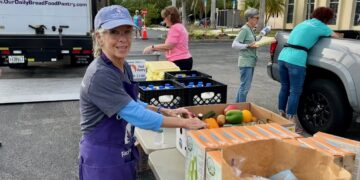It’s harvesting day at Care 2 Grow farm, the 2.5-acre property in Golden Gate Estates where Russell Hollander grows gourmet mushrooms for the local wholesale and retail market. Inside a refrigerated shipping container whose atmosphere feels like a cool, damp forest, Hollander, 41, is dressed in a pair of blue jeans and a T-shirt with a picture of a mushroom on it. “Trust me,” the shirt says, “I have good morels.” He walks down the line, naming the mushrooms he grows: lion’s mane, golden oyster, black pearl king oyster, hen-of-the-woods, shiitake. He talks about fungi with the kind of knowledge and enthusiasm that would put most Ph.D. holders to shame. “Fungi are part of the soil, they’re part of us and they’re an amazing, amazing part of our health,” he says.
Since the documentary Fantastic Fungi came out in 2019, mushrooms have been having a moment. Consumers have become more and more interested in the health and culinary benefits of fungi, and enthusiastic mycologists such as Hollander are producing a ready supply. Originally a carpenter by trade, Hollander started growing mushrooms casually in 2015. “That’s when I kind of fell in love with fungus,” he says. He started growing them more seriously in 2019, and launched his business in 2020.
His farm has two climate-controlled shipping containers, plus a 48-foot tractor trailer. “My footprint to produce what I produce is small compared to other crops,” he says. “It’s very efficient.”
He grows between 120 and 200 pounds of mushrooms each week, but he could sell five times as much. In the next few years, he plans to up his yield to 1,000 pounds a week. The market can bear it. His only limiting factor right now is time. “We don’t have any chairs here,” he says, gesturing around the farm. “Nobody has time to sit down.”
Despite the challenges of the pandemic over the last two years—especially to the restaurant industry—Hollander has maintained a steady business. He sells his gourmet mushrooms to local restaurants in bulk. Though he takes orders for specific fungi, most of his chef clientele prefer a mixed box—a pound of whatever mushrooms Hollander has harvested that week. “Chefs like to be creative,” he says. “They enjoy the challenge of something new.”
When he sends over a mushroom they haven’t tried before, they’ll ask him how to prepare it. Then they’ll test-run the ingredient in a new dish and see how well the dish sells. From there, they’ll adjust their future orders accordingly.
Hollander’s client list reads like a who’s-who of the local farm-to-table scene—Organically Twisted, Nosh, The Local, Inyoni Farms, The Claw Bar, Cafe Nutrients, Rosy Tomorrows, The 239. He also sells direct to consumers once a week at the Third Street South Farmers Market. The business-to-business experience is more natural for him, he says. “The chefs already know me, and they know they want my mushrooms. The farmers market gives me more exposure, but I have to be a salesman.”
He might be hesitant with sales, but Hollander’s natural enthusiasm for his produce is contagious. Inside the converted trailer, he inspects the different mushrooms in various stages of development. In addition to the fungi destined to be stirred into risotto or folded into ravioli, he also grows medicinal mushrooms such as reishi, a flat, coppery-brown mushroom used in traditional Eastern medicine to boost the immune system. Hollander creates a powder from it that can be served in medicinal teas. The powder, plus tinctures he makes from other mushrooms, is one way he manages the highly variable nature of his industry. “It’s farming,” he explains, “so I don’t have a guaranteed harvest. And mushrooms are super perishable.”
He’s had to figure out how to balance sudden bumper crops against unexpected setbacks. A recent problem with his sterilization machine, for example, cost him $5,000. Plus, he has to adjust to the seasonal restaurant demands of Southwest Florida. Tinctures and powders, which keep better and store longer than fresh mushrooms, are just one way he’s developed to counteract these problems.
But for Hollander, the motivations behind his business aren’t simply financial. “I do this because I love it,” he says. “Mushrooms are not only delicious, but they’re a functional food. And the connections they form feeding our human community run even deeper.”






